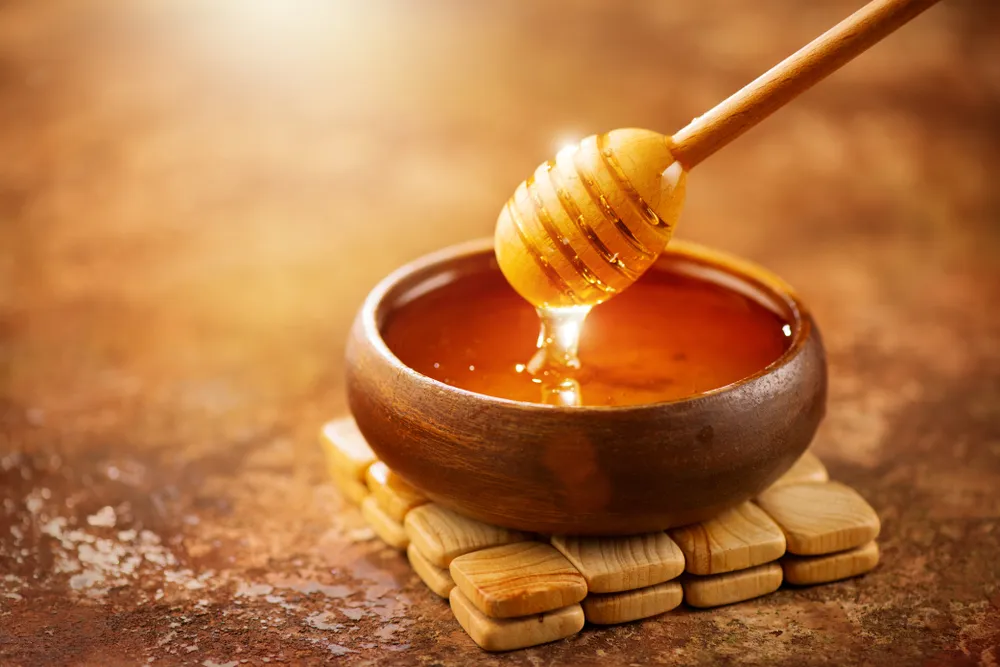Honey: Types, uses, benefits, and side effects

Honey, usually thought of as just a sweetener, is actually so much more. Each jar brings its own story from the busy world of bees to our tables. With a range of flavors and benefits, honey is as diverse as it is delightful.
So, let's get into the sweetness of honey, where we'll chat about its nutritional goodness, explore the different types, unpack its health benefits, and talk about what to watch out for in terms of side effects.
Nutritional benefits of honey
Honey has been a mainstay in traditional Ayurvedic medicine all over the world for centuries. A tablespoon offers a modest calorie count with minimal fat, protein, or fiber. Its claim to fame lies in its polyphenol content, offering you some sweetness, but also a dose of health-promoting compounds, including:
Natural sugars: Honey is a rich source of natural sugars, primarily fructose and glucose, giving quick energy.
Vitamins and minerals: Contains trace amounts of vitamins and minerals like riboflavin and copper, contributing to overall nutrient intake. Antioxidants: Packed with antioxidants, including phenolic acids and flavonoids, especially in darker varieties.Types of honey with unique properties
There is a diverse range of honey types, each with its distinct flavor and health benefits. Some popular honey varieties include:
Manuka honey: Unique to New Zealand, it's known for its potent antibacterial properties, often used in wound healing and skincare. Alfalfa honey: Originating from the purple blossoms of the alfalfa plant, this honey is light with a mild floral taste, often preferred for its understated sweetness. Eucalyptus honey: With a hint of herbal flavors and a slight medicinal scent, eucalyptus honey is famous for its health benefits, particularly in cold and respiratory ailment remedies.Honey types available at Amaltaas:
Amaltaas basic honey: A versatile, all-purpose honey perfect for everyday use. Honey Acacia: Known for its clear, light color and mild taste. Honey wild pure big bee & small bee: Distinct in flavor, reflecting the wild flora from which it's sourced. Sidr honey: Highly valued for its medicinal properties. Honey Robinia: Delicate and sweet flavor profile. Honey with nuts: Delicious blend of both sweet and nutty flavors. Chitral honey: Sourced from the pristine valleys of Chitral, known for its purity.Health benefits of honey
1. Antioxidant-rich
Honey, particularly darker varieties like Manuka and wild honey, is packed with antioxidants. These compounds help neutralize harmful free radicals in the body, potentially reducing the risk of chronic diseases such as heart disease and cancer.
2. Heart health
Regular consumption of honey may contribute positively to heart health. It has been found to lower bad cholesterol levels, reduce triglycerides, and even slightly lower blood pressure. These effects combine to reduce the overall risk of heart disease.
3. Wound and burn healing
Honey, especially Manuka honey, is renowned for its antibacterial and anti-inflammatory properties. When applied topically, it can accelerate the healing process of burns and wounds, making it a valuable natural remedy in first aid.
4. Cough suppression
Honey is a natural cough suppressant, particularly effective in children over one year old. Its thick consistency and soothing properties can reduce cough frequency and improve sleep quality during upper respiratory infections.
5. Blood sugar management
Although honey is a sugar, it also contains antioxidants that may offer some protective effects against metabolic syndrome and type 2 diabetes. It’s considered a better alternative to refined sugar, albeit it should still be consumed in moderation.
6. Digestive health
Honey can play a role in improving digestive health. It's known to soothe the digestive tract, alleviate acid reflux, and even help in the treatment of ulcers.
Potential side effects and precautions
Infant Botulism Risk: Honey should never be given to infants under one year due to the risk of botulism. Allergic Reactions: Some individuals may experience allergic reactions due to bee pollen in honey. Blood Sugar Levels: While honey is healthier than refined sugar, it can still affect blood sugar levels and should be consumed in moderation, especially by diabetics.Ending on a sweet note, let's not forget that our honey is always there to sweeten your day. So go ahead, spread it, spoon it, savor it, and enjoy the natural goodness Amaltaas brings into our everyday moments.




